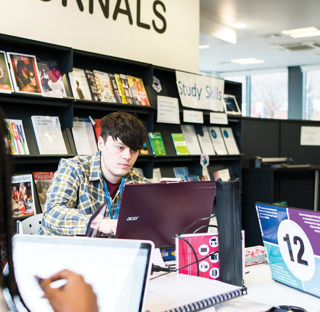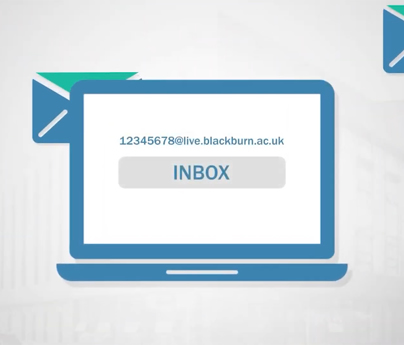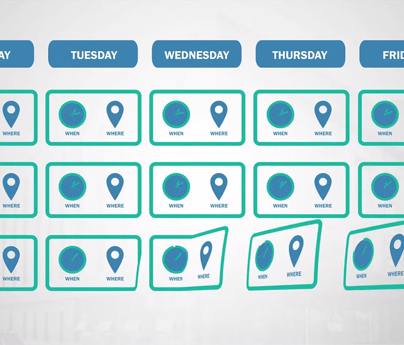Welcome to Higher Education at Blackburn College
There are a few things you need to do before September.
- Make sure you can access your student email
- Make sure you can access Moodle, and your timetable
- If you require one, complete a DBS check
- Think practicalities - for example, think about where you're going to park.
Further information about the steps you need to take, and additional information about your course and college is available below.
We look forward to seeing you in September!
Preparing for your course
Here are some useful tips:
Create a plan
A study plan can be an effective way to help you navigate your studies. With a little planning, you can develop into a motivated and resilient learner ready for any challenges ahead.
Learn with friends
You may find that you learn better in groups or with friends, in which case, you're probably not alone. We are positive you're going to make loads of new friends, so don't be afraid to take charge and arrange group study sessions.
Get ahead, stay ahead
Procrastination is the thief of all good intentions – not to mention assignment grades. Whatever you think you can put off today will only pile up tomorrow, and this applies to everything from assignments to exam revision.
Ask for help
You're not alone! If you don't know - ask. There are plenty of support services inside and outside of the classroom. Get the support you need, whenever you need it!
Look after yourself
Don't underestimate the importance of healthy eating, regular exercise and getting a good night's sleep on your ability to learn, manage stress and tackle assignments. Taking care of your wellbeing can go a long way in ensuring your mind is in tip-top condition.
Online resources to prepare you for studying
- UCAS Study Skills is a great resource if you want to get a head start and brush up on some study skills you will need to succeed at university.
- Money Advice Service: Student Finance is a good read if you want to understand how to better manage your money and finances as a student.
- NUS has a whole host of resources dedicated to ensuring your time at university is a positive one.
Your email
Get to know exactly how your student email works.
Why your student email is important
All email communication from us will be sent to your @live.blackburn.ac.uk email address. Make sure you have access to your account on your phone or set the emails to forward to your personal email address.
How to access your student email
- To access your email, simply go to the homepage of our website, click on “Staff & Students” and then “Student Email”.
- Your email address is your student number 12345678 followed by @live.blackburn.ac.uk. If you aren’t sure what your ID number is, it is printed on your Student ID card.
- Your password is your first initial as a capital letter, then the initial of you surname in lowercase, followed by your date of birth in 8 digits 01092000. So if your name is Joe Bloggs and your date of birth is 1st September 2000 your password would be Jb01092000.
Additional student email guides
- How to log in and reset your default password
- How to divert your College emails to your personal email account
- How to download free Microsoft Office Suite
Moodle and your timetable
Moodle is designed to enhance your learning experience by providing access to online course materials.
What is Moodle?
Moodle is your virtual learning environment. It allows you to:
- Access course materials
- Gain feedback
- Contact tutors
- Upload work
- See grades
- and much more
Moodle is very simple to use. The system is laid out as simply as possible to take the stress out of uploading new assignments and receiving feedback, with messages sent automatically to your email.
How to access Moodle
Go to Moodle directly or visit our Staff and Students page and click/tap "Moodle".
Once on Moodle, log in using your username and password.
- Your login for Moodle is your student number e.g. 12345678. If you aren’t sure what your ID number is, it is printed on your Student ID card.
- Your password is your first initial as a capital letter, then the initial of you surname in lowercase, followed by your date of birth in 8 digits 01092000. So if your name is Joe Bloggs and your date of birth is 1st September 2000 your password would be Jb0192000.
Further guidance on how to use Moodle can be found on the Moodle Helpdesk.
Your timetable and how to access It
Your timetable can be accessed through Moodle.
The importance of checking your timetable
Make sure you check your timetable online so you know where to go and when. If there are any last minute changes to your timetable, such as a room change, this will be shown in your online timetable.
How to access your timetable
To access your timetable log in to Moodle, see Accessing Moodle for help, click on dashboard and then click to see your timetable. Alternatively visit one of our Timetable Stations around campus and scan your ID card.
Can't find your timetable?
Don't worry! We are still finalising some timetables, which will be released before you start your course in September. In the meantime, familiarise yourself with Moodle - and be sure to regularly login and check for your timetable over the coming weeks.
Disclosure and Barring Service Check
Some courses (including Early Years, Health and Social Care and Sport) require you to have completed a DBS (Disclosure Barring Service) check. If this applies to you make sure you complete your application online as you will not be able to go on placement without it. If you are not sure if you need a DBS check, speak to your Key College Contact to check.
What will it cost you?
£25 to you, the student. The remainder of the cost is subsidised by Blackburn College.
What identity documents do I need to provide?
To complete your DBS check you will need:
- 3 forms of ID (see below)
- Your home address(es) for the last 5 years - this should include month and year that you lived there
At least one of these:
- Passport
- Birth certificate
- Provisional/full driving licence
- National identity card
Two or three of these:
- Adoption certificate
- Official letter confirming your National Insurance Number
- Recent bank statement (less than 3 months old), back account opening confirmation letter (less than 3 months old)
- P45 or P60 statement
- Official letter from college or high school (dated in the last 3 months and must include your name and address)
For further information and guidance see the Government’s DBS ID checking guidelines or the Basic DCS checks: guidance.
When your DBS Certificate arrives, keep it in a safe place because you will need to show it to your tutor as well as each placement that you go on. Replacements are expensive, so keep it safe.












